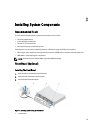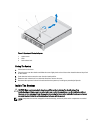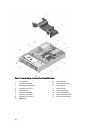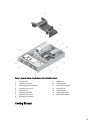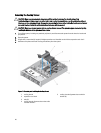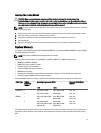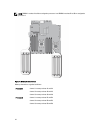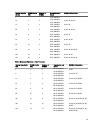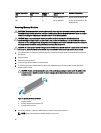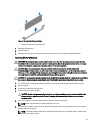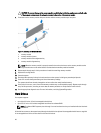
Installing The Cooling Shroud
CAUTION: Many repairs may only be done by a certified service technician. You should only perform
troubleshooting and simple repairs as authorized in your product documentation, or as directed by the online or
telephone service and support team. Damage due to servicing that is not authorized by Dell is not covered by your
warranty. Read and follow the safety instructions that came with the product.
NOTE: For proper seating of the cooling shroud in the system chassis, ensure that the cables inside the system are
routed appropriately.
1. Align the tabs on the cooling shroud with the alignment slots on the fan bracket, and the cable retention bracket.
2. Lower the cooling shroud into the chassis until firmly seated.
3. If applicable, install the full-length full-height expansion card on slot 2 of expansion-card riser 2.
4. Close the system.
5. Reconnect the system to its electrical outlet and turn the system on, including any attached peripherals.
System Memory
Your system supports DDR3 unbuffered ECC DIMMs (UDIMM ECC) and registered DIMMs (RDIMMs). It supports DDR3
and DDR3L voltage specifications.
NOTE: MT/s indicates DIMM speed in MegaTransfers per second.
Memory bus operating frequency can be 1600 MT/s, 1333 MT/s, 1066 MT/s, or 800 MT/s depending on:
• DIMM type (UDIMM or RDIMM)
• DIMM configuration (number of ranks)
• maximum frequency of the DIMMs
• number of DIMMs populated per channel
• DIMM operating voltage
• system profile selected (for example, Performance Optimized, Custom, or Dense Configuration Optimized)
• maximum supported DIMM frequency of the processors
The following table shows the memory populations and operating frequencies for the supported configurations.
DIMM Type DIMMs
Populated/
Channel
Operating Frequency (in MT/s) Maximum DIMM Rank/
Channel
1.5 V 1.35 V
UDIMM ECC 1 1333, 1066, and 800 1333, 1066 and 800 Dual rank
2 1333, 1066, and 800 1066 and 800 Dual rank
RDIMM 1
1600, 1333, 1066 and 800
1333
1333, 1066 and 800
1066 and 800
Dual rank
Quad rank
2
1333, 1066 and 800
1600, 1333, 1066 and 1066
1066 and 800
1066 and 800
1333, 1066, and 800
1066 and 800
Dual rank
Quad rank
The system contains 12 memory sockets split into two sets of six sockets, one set per processor. Each six-socket set is
organized into three channels. In each channel, the release levers of the first socket is marked white and the second
black.
41





